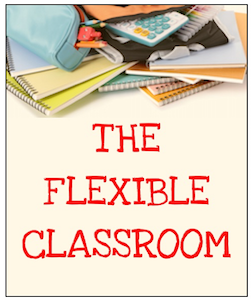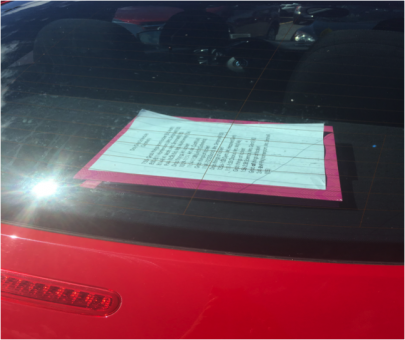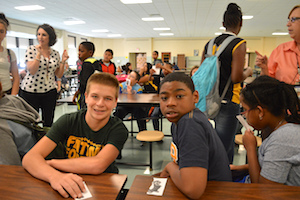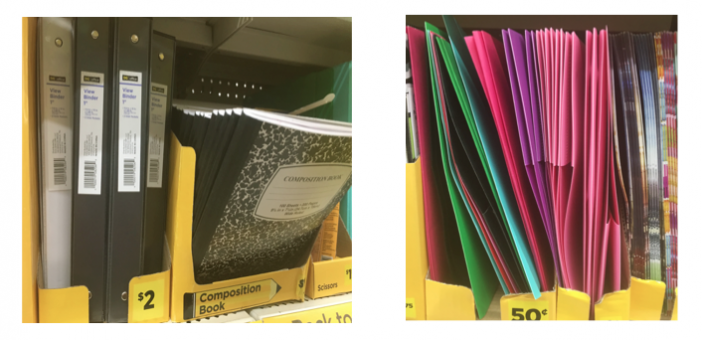Let’s Stop Grading Our Kids on Responsibility
A MiddleWeb Blog
 I have to start with a confession. I am both Type A and a reformed “responsibility grader.”
I have to start with a confession. I am both Type A and a reformed “responsibility grader.”
This means I am organized, on-time, and over-prepared at all times. It also means that I used to give students a grade for those attributes, or more memorably, the lack thereof. There’s a true dichotomy of thought on this topic, and I’ve lived on both sides.
As you are already likely noticing, now that the first-weeks shine is fading, there are kiddos coming to your class unprepared, without the needed or requested supplies, not turning in work (even insisting that they did it), and late to class. You know – generally not being responsible.
Before you grab a rubric and start assigning a grade for all these errant behaviors, I’m going to ask you to do an experiment that will change the dynamic of your classroom.
Stop grading students on responsibility. Here’s why:
Socio-economic bias

Aside from being a commentary on the wild underfunding of schools, here’s the problem with that.
- The small Mom and Pop stores in neighborhoods where families don’t have cars don’t sell these or there might be a very limited supply;
- Additionally, there’s a whole demographic who can’t or won’t buy these supplies,
- And there are also teachers who will give students a homework grade for not having them.
Guess how many stores I visited to find a yellow, three-prong, plastic folder, with pockets? The search was practically a full time job, and many people who are just squeaking by don’t have time after their multiple jobs to make this happen.
How many students does poverty (or simply a limited amount of money in a family to spend on clothes, backpacks, lunch boxes, and supplies multiplied by the number of children) impact?
It obviously depends on where one lives, but the supplies within walking distance of my own house would force my children to be non-compliant, or even “not responsible” if I didn’t have transportation. No yellow folders or multi-colored composition books around here.
We all know that students will do anything to not be singled out – to blend in during middle school. If their supplies don’t match, or they can’t afford new materials, students will “forget” every single time rather than share the truth about their situation.
I’ll fully admit that I used to have very detailed supply lists, but after I had my own children who were in school, I realized that I was asking way too much in the context of a “fair and equal education.”
Nowadays, my supply list is this: something to write with, something to write on, and some place to store it safely.
Students are people too
Do you know what my question used to be when students told me they forgot a pencil or left their homework in their locker? (Brace yourself, I wasn’t always so emotionally attuned to the middle school mind).
“Where did you think you were going?”
It pains me to write that because I sound like such a jerk, but I also missed the point: the student cared enough to tell me, the so-called “trusted adult” that she needed something, and I answered with sarcasm. Seriously? But, at the time, I didn’t see my students as people exactly. Once again, my own kids brought me to a new point in empathy and arguably better teaching.
My husband is not a Type A personality, and it seems that it must be a recessive gene or something because both of my children are what I’ll affectionately call “scattered,” though I’ve called it lots of other things as well, particularly when I trip over a single shoe left in the hallway and then trip over its mate in the kitchen. Don’t even get me started on the “where is your karate uniform?” drama in three acts.
The struggle is real. My daughter is now an official middle schooler, and she took it upon herself to rewrite and print out her Day One/Day Two schedule. Hmmm… maybe I’m rubbing off on her. Guess where she left it? The back window of my car. Because, you know, that’s a good place for it.

The abandoned daily schedule
Oooops. Sarcasm from Type A oozing out. Did I say this? No. But, I would have in the days before I looked at my students as actual people, with actual personality traits and genetic leanings.
Relationships, relationships, relationships
As you might have guessed, my Type A superiority complex and sarcasm, paired with my oblivious requests for obscure supplies, didn’t serve me well. Did any of those kiddos see the light and suddenly become responsible? Nope. But thanks to a student nearly a decade ago named Nick, who was actually honest enough to set me straight, I realized that relationships are the pathway to helping kids become more responsibility-minded.
That might mean recognizing socio-economic situations, responding to personal character traits as individuality and not flaws, or, in Nick’s case, acknowledging that most of the time students are trying much harder than we ever know.
Nick was always late. Always. At first, I shot him the obligatory evil eye. After days went on, I asked for a pass, and he’d shake his head. Finally, after several weeks, I blurted out, “Why can’t you ever get here on time?” Not my most shining moment, but true history.
Obviously, he didn’t answer because I had stupidly given him no good way to handle the situation. “Don’t leave this room until you see me, Nick,” was my taking-care-of-business reply. What happened next was that “ah-ha” moment.
Showdown with Nick
“This can’t continue. What is going on?” I asked Nick, dripping with accusation.
“I’m coming from gym. I have to go get all of my books from my locker, and then I have to come all the way over here,” Nick explained.
“Well, everyone else manages to do it. Why not you?” I asked, hammering away.
“I’m sorry. I only get to shower on gym days. Whatever, I’ll just stop,” Nick said, his voice breaking as he tossed his long bangs out of his eyes and looked out the window.

I got a gym teacher to let him shower during AM homeroom, and let guidance know more about Nick’s circumstances so they could give him deodorant and a comb. The gratitude Nick had was beyond humbling.
As I write this, I wonder why I’ve never written about it before. The truth isn’t exactly noble, perhaps. I am a teacher, and I know that we are doing the best we can do, with what we have, from where we are. I don’t want to sound accusatory or like I have it all figured out now.
I don’t like it when other teachers think I’m a pushover for accepting late work. Or whisper that I don’t have good classroom management when a kid accidentally swears and I just remind her to use an “appropriate time and place” word choice and skip the referral.
I do know that the teacher I once was had great intentions and would never purposely make a child feel that he or she was less than worthwhile. But, I also did those negative things, and I guess I haven’t wanted to atone for them by fessing up.
Being mindful
I imagine most veteran teachers have done some things they regret.
I’m asking you to reconsider grading for responsibility, not only because it distorts the picture of their academic progress, but because it limits the impact you can have on a student’s life. If I’m lucky, I can stop you before you have your own Nick story that you don’t really want to tell.
I promise that considering the socio-economic contexts of your requests – or erring on the side of a child’s quirky personality instead of trying to “fix them” – and remembering that most kiddos are likely trying their best to make their way in a challenging world – will change your life. And more important, your mindfulness will change theirs.
Do you grade for responsibility? Why or why not? Share in the comments…
































I see myself in your words. Fortunately, I saw the light a while ago myself. Whew! I regret the pain I may have caused a child/student.
Thanks for commenting! It is cringe worthy to admit that I ever thought more of protocol than my students. I didn’t even realize it…
I do take notes and logs of behaviours, but I only grade submitted work. There are students I’ve already established exceptions for, but I still keep my logs. It’s just an informative tool when I conference with students or parents in case of academic performance drops. Some students see their own behaviour patterns after my monthly conference with each of them. We discuss whether any of those negative behaviours impacted their performance, and if it’s a circumstance they can change, we develop action plans.
But my gradebook only contains actual work, and I’ve taken late work up to the last day of a semester. I’m a Type B teacher, and I procrastinate. I am often scattered. But I get work done when it counts, and I can empathise with students who behave like me.
I love that you use the data for a monthly conference! That, to me, is the whole point of data collection–to learn about and help students. Your last line could be my family mantra!
Thank you – that took a bit of courage to put yourself and your growth on display for the rest of us.
Thanks for that. I have to say, when I posted it on my Facebook I had bitterflies.
You’re a born writer, Amber. This is a great article. Your students are lucky to have you, your focus is spot on.
You made my day! I really appreciate it.
This is a great article!!! You’re bringing self-reflection to a whole new level! Having worked in districts ranging from the most urban of the urban to upper middle class… your commentary on socio-economic status applies to students even in “rich” communities. We, as teachers, never know what is happening in the lives of our students outside of school. Your empathy and willingness to share your insights is commendable!
Thanks so much. I love that you note that “rich” schools have these problems too. They might have money, but are bankrupted in other areas. I once had a 10th grader whose parents went to Italy and left him by himself! Great points.
I’ve had more than one healthy debate about this topic (and I love that!) What I’m hearing is that we will create a generation of slackers if teachers don’t grade responsibility. I’d clarify to say you don’t grade for it, but it doesn’t mean you can’t expect it and provide guidance for those who struggle. The grading part is my issue. What do you think?
Thanks so much Amber for reminding me that it really is all about relationships and that unconditional positive regard and empathy are keys that will allow our students to trust us enough to let us do our job. Once that relationship is established, students will begin to be more responsible. They have to trust us first.
Please also keep in mind this means assigning homework that means the student needs a compass or protracter…the one that is at school.
Or at least helping the student gather the tools to put in the pencil pouch to go home.
Even my family struggles to get these items. We are a one income family (teacher) with two adults and two students.
Hi Amber – great read! We DO assess – and report out – habits of work and learning (aka character traits) but separately from the skills and content work students produce. In fact, the kids do this weekly themselves. We have a Weekly Reflection form they fill out Monday, setting a goal against a character target (this week it’s Initiative). On Friday, they reflect on their efforts and accomplishments and we comment with our observations; then it goes home to parents to review and serve as a conversation starter. It isn’t perfect but we collect them, file them and they serve as a great resource for portfolios and student led conferences.